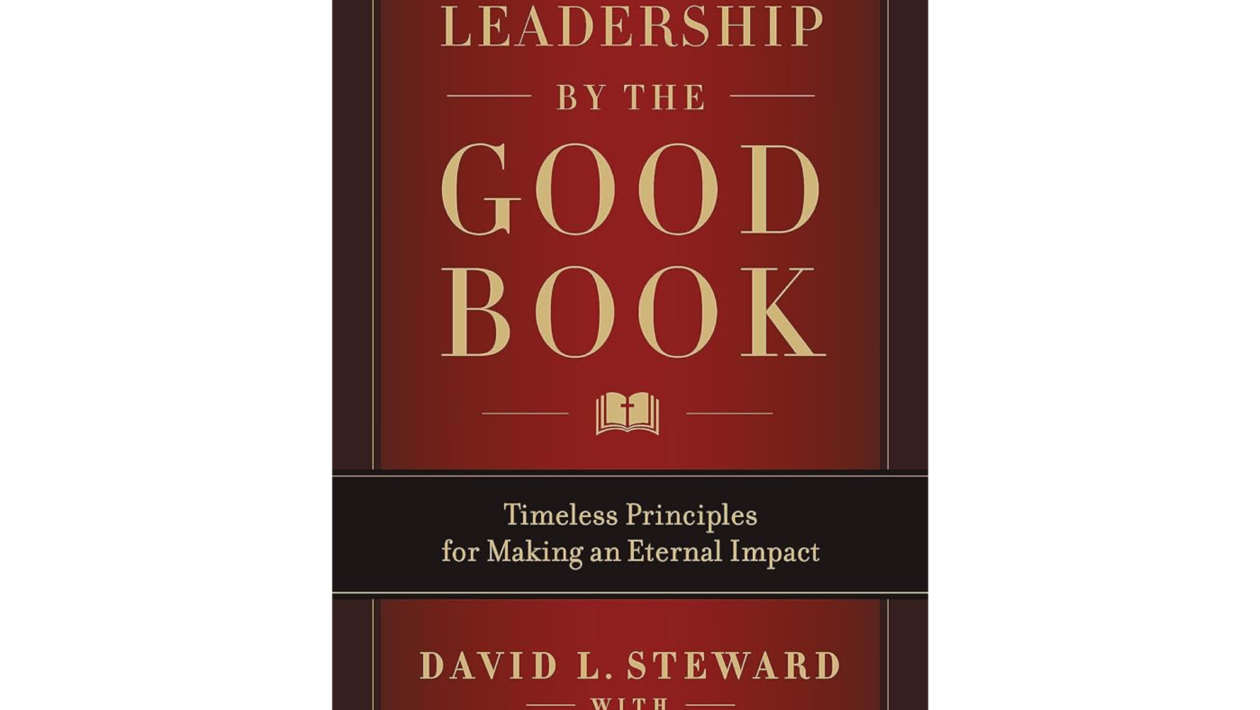By David L. Steward & Brandon K. Mann
FaithWords (2020)
Hardcover, 320 pages
Reviewed by DAVID G. STEWARD
David L. Steward, with whom I just so happen to share a name, is the primary author of Leadership by the Good Book and comes to the table with impressive credentials. Steward founded World Wide Technologies (WWT), a global technology solutions firm; in 30 years, WWT has become a $12 billion company in annual revenues and the largest African-American owned business in the world. What’s more impressive than the obvious material success of WWT is the founder’s spiritual commitment to biblical principles, to which he attributes his success. Leadership by the Good Book shows how to apply these same biblical principles to not only propel an organization forward but to make an eternal impact for God’s kingdom. This book stands in direct contrast to leadership done through selfish, worldly principles by demonstrating, with a track record to back it up, that allowing the Bible to guide a leader results in real success.
The book begins by quoting Jesus’s philosophy for being a great leader: to serve and not be served (Mark 10:43–45) (p. 3). This is the essence of servant leadership and the secret for true success—serving God first and others second. Beginning with a whole section on service, the book is divided into 10 sections, with each section containing three chapters. The section titles contain only a single word, making them simple, yet insightful: serve, love, imagine, invest, risk, trust, share, follow, grow, and celebrate.
The majority of the book provides good common-sense principles based on the author’s experience and Bible verses. For instance, when quoting Proverbs 22:1, “A good name is more desirable than great riches” (NIV), the book emphasizes the importance of integrity and honesty in leadership since “it takes a lifetime to build a good reputation, yet it can be lost overnight” (p. 19). The author shares his own experience in the early years of his business when finances were so bad that his car was repossessed with employees looking on; he was also unable to draw a salary for months! Yet his faith in God’s Word (such as Psalm 91) and its promises kept him moving forward. Building a business while trusting in God provided a compelling testimony that was arguably the book’s greatest strength.
A key principle emphasized throughout the book was the importance of humility, as modeled by Jesus Christ (p. 47), which stands in direct contrast to acting from EGO—Edging God Out, a clever acronym (pp. 116, 222). Humility includes loving others enough to care about them, including the “little” people. A classic example given was a business professor who had just one question on his final exam: “I have one question for you, and how you answer it is the most important thing for you to know about managing people. What is the name of the person who cleans this building we’re in? You’ve all passed by her. Now I want to know who has taken the time to at least ask her name?” (p. 52). What a practical lesson not to be forgotten!
This triggered an experience that had an impact on me when I was studying business in college. I was helping to build an impressive custom home overlooking the Napa Valley for one of my psychology professors. His father was a very successful and wealthy businessman from Maryland who founded and managed a host of well-known hotel chains, including Quality Inn and Comfort Suites. One day the professor’s mother, uncle, and father, who were bankrolling the home, came to visit and examine the progress of the home building project. I was just a laborer trying to pay my way through college, and the mother and uncle treated me as such, with no acknowledgement of me as they walked by with an air of importance. However, the successful father took the time to shake my hand and ask me questions about myself, including what I was studying in school. He was humble enough to speak to the little people, which helps explain his amazing success in the business world. This short experience was worth more than what I learned from my business textbooks that quarter.
Steward’s book offers many helpful tips. For example, we should give to those in need to demonstrate God’s love and invest in eternity (p. 28). Treat people as individuals, not job fillers (p. 52). God can do the impossible, so don’t be discouraged by setbacks (p. 163). Success depends on strong faith, hard work, and tenacity—grit! (pp. 101, 162). When we are faithful, God is fruitful (p. 163). We should be faithful to principle but flexible with methods (p. 109).
One of the more impactful chapters was Chapter Nine, about building an eternal legacy and pursuing an “eternal rate of return” (p. 90). Chapter Fifteen challenges the reader to “risk your reputation for what’s right” (p. 147). A key takeaway here is that when your actions are based on godly/biblical principles, you can move forward with confidence, even if this runs contrary to the approval of others (i.e., be a God-pleaser vs. a man-pleaser).
Overall, I would recommend the book Leadership by the Good Book because it shares godly principles that should help any organization “seek first the kingdom of God and His righteousness, and all these things shall be added to you” (Matt. 6:33, NKJV). It emphasizes treating people right and by the Golden Rule. If followed, this book’s advice would result in organizations that would likely have higher morale and more productivity from their employees and happier customers/clients. Each chapter provided helpful, thought-provoking questions that could be useful for group discussions or personal reflection. While not containing earth-shattering advice, the book provided solid Christian leadership principles.
David G. Steward is the senior pastor of the Fallbrook Seventh-day Adventist Church. He was formerly a traveling evangelist for a decade and a prosecuting attorney for 15 years.

